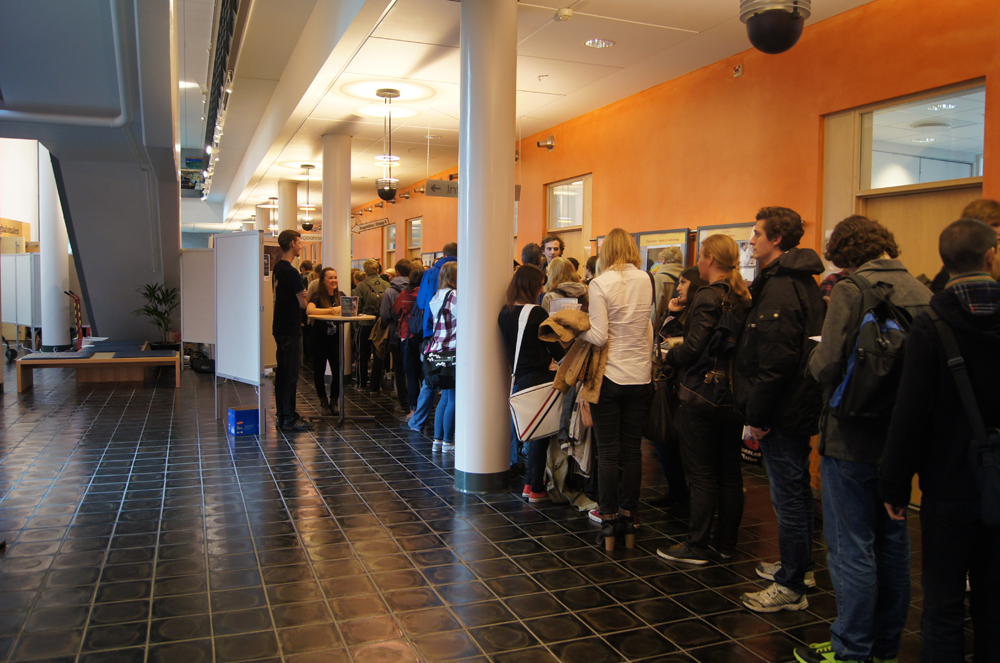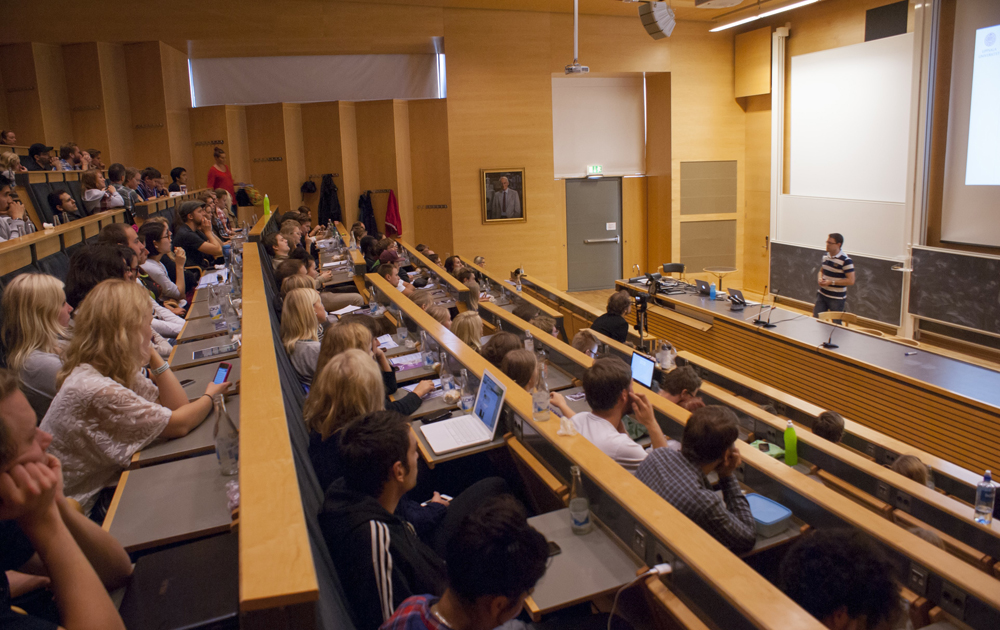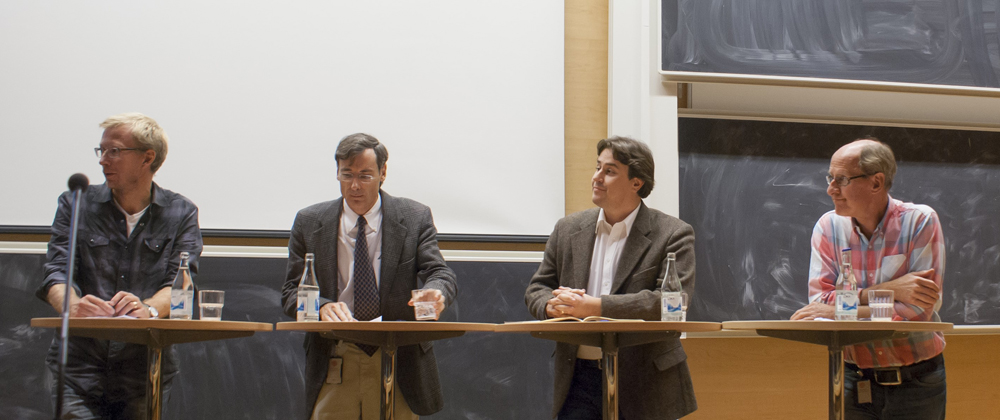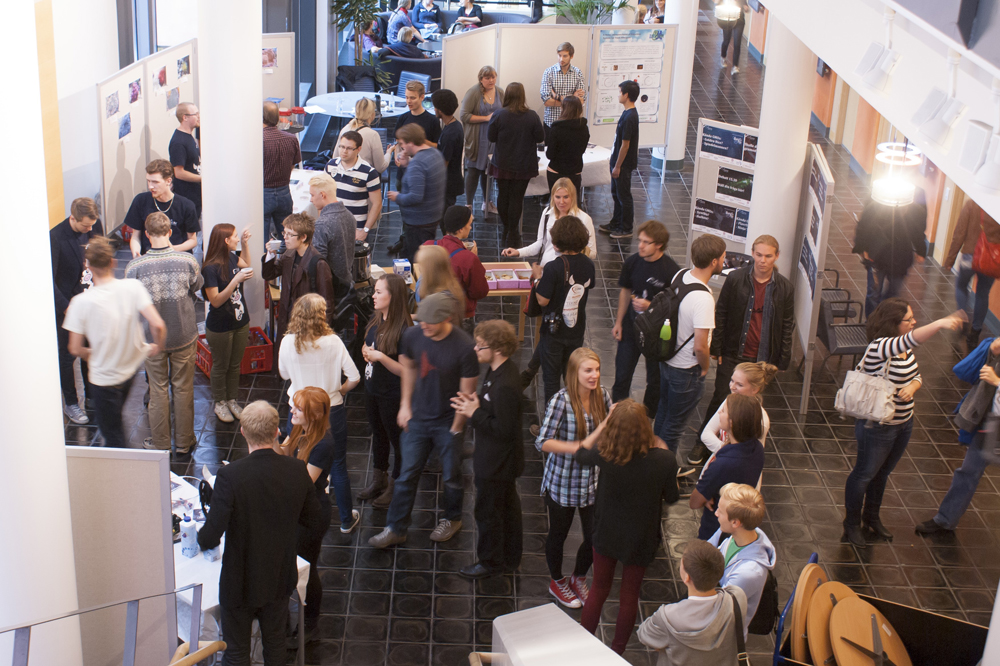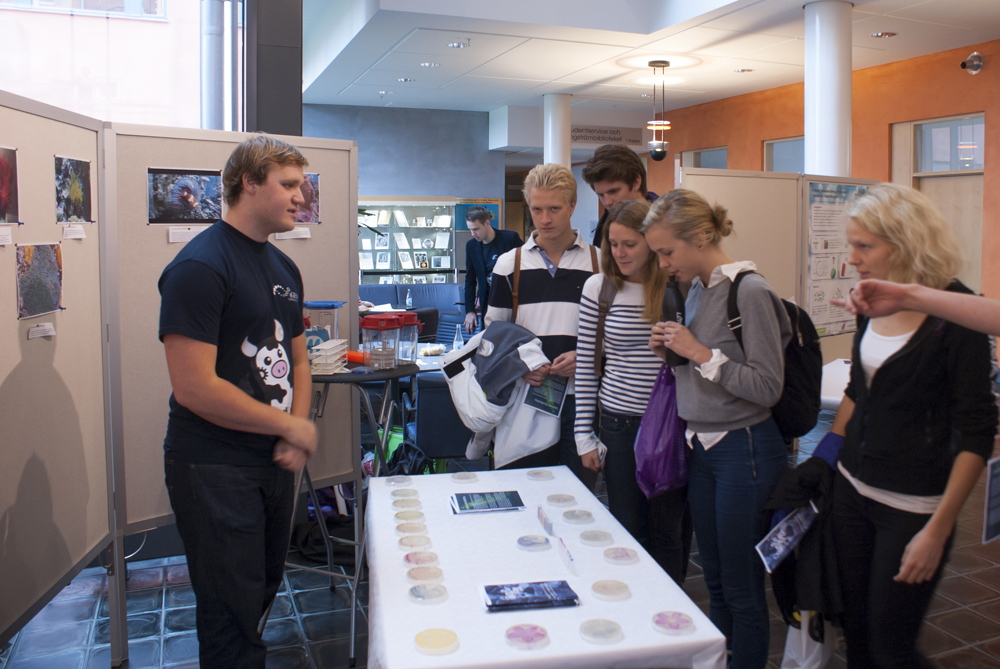Team:Uppsala/synbioday
From 2013.igem.org
| (10 intermediate revisions not shown) | |||
| Line 14: | Line 14: | ||
</style> | </style> | ||
| + | <script type="text/javascript"> | ||
| + | /*Acts once the document is loaded*/ $(document).ready(function() { /*Move the tn-main-wrap as child of <body>*/ $("#tn-main-wrap-wrap").prependTo($("body")); /*Move the menubars in the tn-main-wrap*/ $("#menubar.left-menu").appendTo($("#tn-main-wrap")); $("#menubar.right-menu").appendTo($("#tn-main-wrap")); | ||
| + | /*Spoiler JS*/ $(".tn-spoiler div").slideUp(); $(".tn-spoiler a").click(function(e) { e.preventDefault(); $(".tn-spoiler-active").removeClass("tn-spoiler-active"); $(this).parent().addClass("tn-spoiler-active"); $(".tn-spoiler").not(".tn-spoiler-active").children("div").slideUp(); $(".tn-spoiler-active").children("div").slideToggle(); }); | ||
| + | /*Add favicon*/ $("link[rel='shortcut icon']").remove(); $("head").append("<link rel='shortcut icon' type='image/png' href='https://static.igem.org/mediawiki/2013/6/6d/Uppsalas-cow-con.png'>"); }); | ||
| + | </script> | ||
| + | |||
| + | <link href="https://2013.igem.org/Team:Uppsala/lightbox-css-code.css?action=raw&ctype=text/css" type="text/css" rel="stylesheet"> | ||
| + | |||
| + | <script src="https://2013.igem.org/Team:Uppsala/jquery-code.js?action=raw&ctype=text/javascript" type="text/javascript"></script> | ||
| + | |||
| + | <script src="https://2013.igem.org/Team:Uppsala/lightbox-code.js?action=raw&ctype=text/javascript" type="text/javascript"></script> | ||
</head> | </head> | ||
| Line 30: | Line 41: | ||
<div id="igem"><a href="https://2013.igem.org/Main_Page"><img class="igem" src="https://static.igem.org/mediawiki/2013/b/b8/Uppsala2013_Uppsala_IGEM_log_blue.png"></a></div> | <div id="igem"><a href="https://2013.igem.org/Main_Page"><img class="igem" src="https://static.igem.org/mediawiki/2013/b/b8/Uppsala2013_Uppsala_IGEM_log_blue.png"></a></div> | ||
| + | |||
| + | <img class="slogan" src="https://static.igem.org/mediawiki/2013/a/ad/Uppsala2013_Header.png"> | ||
</div> | </div> | ||
| Line 57: | Line 70: | ||
<li><a href="https://2013.igem.org/Team:Uppsala/metabolic-engineering">Metabolic engineering</a> | <li><a href="https://2013.igem.org/Team:Uppsala/metabolic-engineering">Metabolic engineering</a> | ||
<ul> | <ul> | ||
| - | <li><a href="https://2013.igem.org/Team:Uppsala/p-coumaric-acid"> | + | <li><a href="https://2013.igem.org/Team:Uppsala/p-coumaric-acid">p-Coumaric acid</a></li> |
<li><a href="https://2013.igem.org/Team:Uppsala/resveratrol">Resveratrol</a></li> | <li><a href="https://2013.igem.org/Team:Uppsala/resveratrol">Resveratrol</a></li> | ||
<li><a href="https://2013.igem.org/Team:Uppsala/lycopene">Lycopene</a></li> | <li><a href="https://2013.igem.org/Team:Uppsala/lycopene">Lycopene</a></li> | ||
| Line 78: | Line 91: | ||
<li><a href="https://2013.igem.org/Team:Uppsala/modeling" id="list_type1"><img class="nav-text" src="https://static.igem.org/mediawiki/2013/6/63/Uppsala2013_Modeling.png"></a> | <li><a href="https://2013.igem.org/Team:Uppsala/modeling" id="list_type1"><img class="nav-text" src="https://static.igem.org/mediawiki/2013/6/63/Uppsala2013_Modeling.png"></a> | ||
<ul> | <ul> | ||
| - | <li><a href="https://2013.igem.org/Team:Uppsala/P-Coumaric-acid-pathway"> | + | <li><a href="https://2013.igem.org/Team:Uppsala/P-Coumaric-acid-pathway">Kinetic model</a></li> |
<li><a href="https://2013.igem.org/Team:Uppsala/modeling-tutorial">Modeling tutorial </a></li> | <li><a href="https://2013.igem.org/Team:Uppsala/modeling-tutorial">Modeling tutorial </a></li> | ||
| + | |||
| + | <li><a href="https://2013.igem.org/Team:Uppsala/toxicity-model">Toxicity model</a></li> | ||
</ul></li> | </ul></li> | ||
<li><a href="https://2013.igem.org/Team:Uppsala/parts" id="list_type2"><img class="nav-text" src="https://static.igem.org/mediawiki/2013/e/eb/Uppsala2013_parts.png"></a></li> | <li><a href="https://2013.igem.org/Team:Uppsala/parts" id="list_type2"><img class="nav-text" src="https://static.igem.org/mediawiki/2013/e/eb/Uppsala2013_parts.png"></a></li> | ||
| Line 88: | Line 103: | ||
<li><a href="https://2013.igem.org/Team:Uppsala/carotenoid-group">Carotenoid group</a></li> | <li><a href="https://2013.igem.org/Team:Uppsala/carotenoid-group">Carotenoid group</a></li> | ||
<li><a href="https://2013.igem.org/Team:Uppsala/chassi-group">Chassi group</a></li> | <li><a href="https://2013.igem.org/Team:Uppsala/chassi-group">Chassi group</a></li> | ||
| + | <li><a href="https://2013.igem.org/Team:Uppsala/advisors">Advisors</a></li> | ||
</ul></li> | </ul></li> | ||
| Line 97: | Line 113: | ||
<li><a href="https://2013.igem.org/Team:Uppsala/public-opinion">Public opinion </a></li> | <li><a href="https://2013.igem.org/Team:Uppsala/public-opinion">Public opinion </a></li> | ||
<li><a href="https://2013.igem.org/Team:Uppsala/Outreach">High school & media </a></li> | <li><a href="https://2013.igem.org/Team:Uppsala/Outreach">High school & media </a></li> | ||
| - | + | <li><a href="https://2013.igem.org/Team:Uppsala/bioart">BioArt</a></li> | |
| + | <li><a href="https://2013.igem.org/Team:Uppsala/LactonutritiousWorld">A LactoWorld</a></li> | ||
| + | <li><a href="https://2013.igem.org/Team:Uppsala/killswitches">Killswitches</a></li> | ||
| + | <li><a href="https://2013.igem.org/Team:Uppsala/realization">Patent</a></li> | ||
</ul></li> | </ul></li> | ||
| - | <li><a href="https://2013.igem.org/Team:Uppsala/attribution" id="list_type4"><img class="nav-text" src="https://static.igem.org/mediawiki/2013/5/5d/Uppsala2013_Attributions.png"></a | + | <li><a href="https://2013.igem.org/Team:Uppsala/attribution" id="list_type4"><img class="nav-text" src="https://static.igem.org/mediawiki/2013/5/5d/Uppsala2013_Attributions.png"></a></li> |
| - | + | ||
| - | + | ||
| - | + | ||
<li><a href="https://2013.igem.org/Team:Uppsala/notebook" id="list_type3"><img class="nav-text" src="https://static.igem.org/mediawiki/2013/3/36/Uppsala2013_Notebook.png"></a> | <li><a href="https://2013.igem.org/Team:Uppsala/notebook" id="list_type3"><img class="nav-text" src="https://static.igem.org/mediawiki/2013/3/36/Uppsala2013_Notebook.png"></a> | ||
<ul> | <ul> | ||
<li><a href="https://2013.igem.org/Team:Uppsala/safety-form">Safety form</a></li> | <li><a href="https://2013.igem.org/Team:Uppsala/safety-form">Safety form</a></li> | ||
| + | <li><a href="https://2013.igem.org/Team:Uppsala/protocols">Protocols</a></li> | ||
</ul></li> | </ul></li> | ||
</ul> | </ul> | ||
| Line 116: | Line 133: | ||
<p>Perhaps the most important human practice addition to this years project was our arranging of Uppsala SynBioDay. We wanted to create a single event where all interest groups could be gathered including students, academia, private and public sector. The day comprised of lectures, iGEM project presentations, a bioethics debate and exhibitions. The main theme of the day was synthetic biology and genetically modified food. The reason for this was to create another opportunity to address issues related to our project of genetically modified probiotics and food production. The day was a great success and attracted over 200 participants and will be turned into an annual event.</p> | <p>Perhaps the most important human practice addition to this years project was our arranging of Uppsala SynBioDay. We wanted to create a single event where all interest groups could be gathered including students, academia, private and public sector. The day comprised of lectures, iGEM project presentations, a bioethics debate and exhibitions. The main theme of the day was synthetic biology and genetically modified food. The reason for this was to create another opportunity to address issues related to our project of genetically modified probiotics and food production. The day was a great success and attracted over 200 participants and will be turned into an annual event.</p> | ||
<br> | <br> | ||
| - | <div><img class="synbioday-pic" src="https://static.igem.org/mediawiki/2013/b/b9/Uppsala2013_Synbio1.jpg"></div> | + | <div><a href="https://static.igem.org/mediawiki/2013/b/b9/Uppsala2013_Synbio1.jpg" data-lightbox="roadtrip" title="A line is forming for the opening of Uppsala SynBioDay"><img class="synbioday-pic" src="https://static.igem.org/mediawiki/2013/b/b9/Uppsala2013_Synbio1.jpg"></a></div> |
<i class="clear">A line is forming for the opening of Uppsala SynBioDay</i> | <i class="clear">A line is forming for the opening of Uppsala SynBioDay</i> | ||
<br> | <br> | ||
| Line 122: | Line 139: | ||
<p>The schedule for the day included lectures about basic synthetic biology, more advanced research in synthetic biology and about probiotics. The day also included two iGEM project presentations including our own and iGEM Linköping</p> | <p>The schedule for the day included lectures about basic synthetic biology, more advanced research in synthetic biology and about probiotics. The day also included two iGEM project presentations including our own and iGEM Linköping</p> | ||
<br> | <br> | ||
| - | <div><img class="synbioday-pic" src="https://static.igem.org/mediawiki/2013/1/11/Uppsala2013_Synbio2.jpg"></div> | + | <div><a href="https://static.igem.org/mediawiki/2013/1/11/Uppsala2013_Synbio2.jpg" data-lightbox="roadtrip" title="Ph.D. student Erik Gullberg holding an introductory talk about synthetic biology"><img class="synbioday-pic" src="https://static.igem.org/mediawiki/2013/1/11/Uppsala2013_Synbio2.jpg"></a></div> |
<i>Ph.D. student Erik Gullberg holding an introductory talk about synthetic biology</i> | <i>Ph.D. student Erik Gullberg holding an introductory talk about synthetic biology</i> | ||
<br> | <br> | ||
| - | <a id="debate-anchor"><h1>Bioethics debate</h1 | + | <a id="debate-anchor"></a><h1>Bioethics debate</h1> |
<p>The day was concluded with a bioethics debate centred on the controversial theme of genetically modified food. The format included four main speakers consisting of three professors and a writer and journalist as well as a moderator. There was first a discussion between the main speakers followed by a long question and answer session where the audience participated</p> | <p>The day was concluded with a bioethics debate centred on the controversial theme of genetically modified food. The format included four main speakers consisting of three professors and a writer and journalist as well as a moderator. There was first a discussion between the main speakers followed by a long question and answer session where the audience participated</p> | ||
<br> | <br> | ||
| - | <div><img class="synbioday-pic" src="https://static.igem.org/mediawiki/2013/9/94/Uppsala2013_Synbio7.jpg"></div> | + | <div><a href="https://static.igem.org/mediawiki/2013/9/94/Uppsala2013_Synbio7.jpg" data-lightbox="roadtrip" title="From left to right: Stefan Roos, assoc prof. Microbiology. Anthony Forster, prof. synthetic biology. Waldemar Ingdahl, science journalist and author. Mats G. Hansson prof. bioethics"><img class="synbioday-pic" src="https://static.igem.org/mediawiki/2013/9/94/Uppsala2013_Synbio7.jpg"></a></div> |
<i>From left to right: Stefan Roos, assoc prof. Microbiology. Anthony Forster, prof. synthetic biology. Waldemar Ingdahl, science journalist and author. Mats G. Hansson prof. bioethics</i> | <i>From left to right: Stefan Roos, assoc prof. Microbiology. Anthony Forster, prof. synthetic biology. Waldemar Ingdahl, science journalist and author. Mats G. Hansson prof. bioethics</i> | ||
<br> | <br> | ||
| Line 134: | Line 151: | ||
<p>To get additional opportunities to engage the participants of the day, several exhibitions were held outside the lecture hall. This comprised a lot of educational and engaging information about synthetic biology. Both Uppsala and Linköping also took this opportunity to present their project posters. We arranged a Bioart exhibition and a bioethics corner where people could discuss and suggest bioethical questions for the bioethics debate.</p> | <p>To get additional opportunities to engage the participants of the day, several exhibitions were held outside the lecture hall. This comprised a lot of educational and engaging information about synthetic biology. Both Uppsala and Linköping also took this opportunity to present their project posters. We arranged a Bioart exhibition and a bioethics corner where people could discuss and suggest bioethical questions for the bioethics debate.</p> | ||
<br> | <br> | ||
| - | <div><img class="synbioday-pic1" src="https://static.igem.org/mediawiki/2013/1/19/Uppsala2013_Synbio3.jpg"></div> | + | <div><a href="https://static.igem.org/mediawiki/2013/1/19/Uppsala2013_Synbio3.jpg" data-lightbox="roadtrip" title="Overview of parts of the exhibition area"><img class="synbioday-pic1" src="https://static.igem.org/mediawiki/2013/1/19/Uppsala2013_Synbio3.jpg"></a></div> |
<i>Overview of parts of the exhibition area</i> | <i>Overview of parts of the exhibition area</i> | ||
<br> | <br> | ||
<br> | <br> | ||
| - | <div><img class="synbioday-pic1" src="https://static.igem.org/mediawiki/2013/d/d1/Uppsala2013_Synbio4.jpg"></div> | + | <div><a href="https://static.igem.org/mediawiki/2013/d/d1/Uppsala2013_Synbio4.jpg" data-lightbox="roadtrip" title="ne of our booths during the day where we explained about this year’s project. In the background you can see a draft of the iGEM Uppsala project poster. In the front we have our concept product, yoghurt+ and the team mascot Moo Moo."><img class="synbioday-pic1" src="https://static.igem.org/mediawiki/2013/d/d1/Uppsala2013_Synbio4.jpg"></a></div> |
<i>One of our booths during the day where we explained about this year’s project. In the background you can see a draft of the iGEM Uppsala project poster. In the front we have our concept product, yoghurt+ and the team mascot Moo Moo.</i> | <i>One of our booths during the day where we explained about this year’s project. In the background you can see a draft of the iGEM Uppsala project poster. In the front we have our concept product, yoghurt+ and the team mascot Moo Moo.</i> | ||
<br> | <br> | ||
| - | <div/><img class="synbioday-pic1" src="https://static.igem.org/mediawiki/2013/e/ec/Uppsala2013_Synbio5.jpg"></div> | + | <a href="https://static.igem.org/mediawiki/2013/e/ec/Uppsala2013_Synbio5.jpg" data-lightbox="roadtrip" title="MABTECH is a world leader in development of ELISpot products and technology and T-cell measurements. They participated and partly sponsored Uppsala SynBioDay. Here their booth at Uppsala SynBioDay can be seen."><div/><img class="synbioday-pic1" src="https://static.igem.org/mediawiki/2013/e/ec/Uppsala2013_Synbio5.jpg"></a></div> |
<i>MABTECH is a world leader in development of ELISpot products and technology and T-cell measurements. They participated and partly sponsored Uppsala SynBioDay. Here their booth at Uppsala SynBioDay can be seen.</i> | <i>MABTECH is a world leader in development of ELISpot products and technology and T-cell measurements. They participated and partly sponsored Uppsala SynBioDay. Here their booth at Uppsala SynBioDay can be seen.</i> | ||
<br> | <br> | ||
| - | <h1>Bioart</h1> | + | <a id="refpoint1"></a><h1>Bioart</h1> |
<p>iGEM Uppsala have made some essential contributions to the registry by providing a range of chromoproteins that produce strikingly colourful cell colonies. While a lot of work in synthetic biology is quite abstract these chromoproteins provides an opportunity to visually present the technology to the public. We used our chromoproteins to “paint” several pictures that we presented to the participants. To find all the parts you need to create your own Bioart, please visit our <a href="https://2013.igem.org/Team:Uppsala/chromoproteins"> chromoprotein page </a> and check out the iGEM Uppsala chromoprotein collection. </p> | <p>iGEM Uppsala have made some essential contributions to the registry by providing a range of chromoproteins that produce strikingly colourful cell colonies. While a lot of work in synthetic biology is quite abstract these chromoproteins provides an opportunity to visually present the technology to the public. We used our chromoproteins to “paint” several pictures that we presented to the participants. To find all the parts you need to create your own Bioart, please visit our <a href="https://2013.igem.org/Team:Uppsala/chromoproteins"> chromoprotein page </a> and check out the iGEM Uppsala chromoprotein collection. </p> | ||
<br> | <br> | ||
| - | <div><img class="synbioday-pic" src="https://static.igem.org/mediawiki/2013/ | + | <div><a href="https://static.igem.org/mediawiki/2013/5/54/Uppsala2013_mange.jpg" data-lightbox="roadtrip" title="A picture of our bioart collection, showing the public what you can do with synthetic biology."><img class="synbioday-pic" src="https://static.igem.org/mediawiki/2013/5/54/Uppsala2013_mange.jpg"></a></div> |
| - | + | ||
| + | <i> A picture of our bioart collection, showing the public what you can do with synthetic biology. </i> | ||
</div> <!-- main_content ends --> | </div> <!-- main_content ends --> | ||
<div id="bottom-pic"> | <div id="bottom-pic"> | ||
| - | + | ||
</div> | </div> | ||
Latest revision as of 20:41, 28 October 2013
Uppsala SynBioDay
Perhaps the most important human practice addition to this years project was our arranging of Uppsala SynBioDay. We wanted to create a single event where all interest groups could be gathered including students, academia, private and public sector. The day comprised of lectures, iGEM project presentations, a bioethics debate and exhibitions. The main theme of the day was synthetic biology and genetically modified food. The reason for this was to create another opportunity to address issues related to our project of genetically modified probiotics and food production. The day was a great success and attracted over 200 participants and will be turned into an annual event.
A line is forming for the opening of Uppsala SynBioDay
Lectures and presentations
The schedule for the day included lectures about basic synthetic biology, more advanced research in synthetic biology and about probiotics. The day also included two iGEM project presentations including our own and iGEM Linköping
Ph.D. student Erik Gullberg holding an introductory talk about synthetic biology
Bioethics debate
The day was concluded with a bioethics debate centred on the controversial theme of genetically modified food. The format included four main speakers consisting of three professors and a writer and journalist as well as a moderator. There was first a discussion between the main speakers followed by a long question and answer session where the audience participated
From left to right: Stefan Roos, assoc prof. Microbiology. Anthony Forster, prof. synthetic biology. Waldemar Ingdahl, science journalist and author. Mats G. Hansson prof. bioethics
Exhibitions
To get additional opportunities to engage the participants of the day, several exhibitions were held outside the lecture hall. This comprised a lot of educational and engaging information about synthetic biology. Both Uppsala and Linköping also took this opportunity to present their project posters. We arranged a Bioart exhibition and a bioethics corner where people could discuss and suggest bioethical questions for the bioethics debate.
Overview of parts of the exhibition area
One of our booths during the day where we explained about this year’s project. In the background you can see a draft of the iGEM Uppsala project poster. In the front we have our concept product, yoghurt+ and the team mascot Moo Moo.

Bioart
iGEM Uppsala have made some essential contributions to the registry by providing a range of chromoproteins that produce strikingly colourful cell colonies. While a lot of work in synthetic biology is quite abstract these chromoproteins provides an opportunity to visually present the technology to the public. We used our chromoproteins to “paint” several pictures that we presented to the participants. To find all the parts you need to create your own Bioart, please visit our chromoprotein page and check out the iGEM Uppsala chromoprotein collection.
A picture of our bioart collection, showing the public what you can do with synthetic biology.
 "
"











